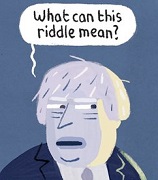|
Dawncloack posted:"But dont you know He kept us out of the war??" Yeah Franco TOTALLY would have kept them out of the war had hitler beaten the soviets or brits he definitely wouldn't have blown into portugal and Gibraltar. Franco also allowed Italian frog men basing rights for moves into Gibraltar.
|
|
|
|

|
| # ? May 25, 2024 14:32 |
|
Elman posted:I assume you went to highschool in the 80s or something? I mean to be fair I grew in a traditionally left wing region, but this sounds bonkers. This is the La Mancha of the tail en of the 90's my man.
|
|
|
|
WAR CRIME GIGOLO posted:Yeah Franco TOTALLY would have kept them out of the war had hitler beaten the soviets or brits he definitely wouldn't have blown into portugal and Gibraltar. Well I don't think that the Spaniards who say "Franco kept us out of the war" would particularly object to the addendum "but he would have joined at the last moment, if he thought Germany had it in the bag". I'm genuinely curious, what's the leftist reading of the Hendaye meeting? Just a bit of horse trading, with Franco wanting to join but needing to get enough territorial bribes to convince his inner circle to support him? Or a real breach between Fascist leaders with different priorities?
|
|
|
|
A lot of portuguese right wing and alt righters will also say that salazar saved portugal from the war and entirely not mention the colonial war. They are also usually found of Franco, hell I mean, in Funchal, Portugal some highschool was named "Francisco franco" by the Salazar regime and it somehow keeps the name.
|
|
|
|
NihilCredo posted:Well I don't think that the Spaniards who say "Franco kept us out of the war" would particularly object to the addendum "but he would have joined at the last moment, if he thought Germany had it in the bag". I've only seen a couple of references to that meeting in more overall histories, not really leftist ones, but it seems that Hitler at least did not come away from that meeting with a positive opinion about Franco and Spain, essentially feeling that Franco just kept talking empty platitudes for horus at end in order to stall the whole thing out and not have to commit or agree to anything in particular. Essentially the deal with Franco and not joining the war to me seems to be down to a fairly simple calculus, he knew Spain was in no way ready to fight a war against a major European power, Spain was devastated from the civil war and economically, industrially and militarily backwards. Essentially this meant that he did not want to take the risk of joining in until Britain was neutralized as a threat. Though Spain was close to Germany and offered aid of various kinds, I don't really think there was much chance of Franco joining the war if he could help it after Germany had failed to defeat Britain in 1940 and the Soviet Union in 1941/1942 (which Hitler often argued would force Britain to the negotiating table), Franco was ruthless and politically savvy and probably more appreciative of his country's weakness than Mussolini was in 1940 when he thought to join in on the war and get a piece of the pie before it ended.
|
|
|
|
NihilCredo posted:Well I don't think that the Spaniards who say "Franco kept us out of the war" would particularly object to the addendum "but he would have joined at the last moment, if he thought Germany had it in the bag". I don't think it's really a leftist reading, but it's important remember that: 1. Before the meeting Hitler sent Awehr chief Wilhelm Canaris to negotiate with Franco. Canaris was secretly an anti-Nazi and told Franco not to join the war. Perhaps even that Germany could not win. 2. Spain's main trading partners were the US and UK. The loss of trade, especially wheat and oil, from joining the war on Germany's side would have been crippling. 3. Spain was still rebuilding from the civil war and really in no shape to fight or defend it's colonies from Britain.
|
|
|
|
NihilCredo posted:
Well like everyone said, franco knew germany was on the brink of collapse in the process of the meeting and partially did a left face and reciprocated UK relations. Franco was a vanity fascist in terms of foreign policy. Selfies with adolf, fascist assault brigades with slappin uniforms etc. However his focus was domestic. Franco realised he needed gibraltar and made a choice of two options A: Join the axis and Invade gibraltar with italy and enjoy a german-italian administration of the mediterranean post britain. B: stay neutral and enjoy trade through the mediterranean without nasty concessions or loss of governance post germany
|
|
|
|
GABA ghoul posted:Good job everyone, Ligur is finally banned. Took a lot of time, training and coordination but we did it! GUESS WHAT
|
|
|
|
NYT did a really interesting long-read investigative journalism piece on the abuse of CAP funding by eastern oligarchs: quote:The Money Farmers: How Oligarchs and Populists Milk the E.U. for Millions Full piece here has some graphics and stuff: https://www.nytimes.com/2019/11/03/world/europe/eu-farm-subsidy-hungary.html
|
|
|
|
The Hungarian people deserve to discover the guillotine, to be honest. Also CAP delenda est, change my mind.
|
|
|
|
Orange Devil posted:Also CAP delenda est, change my mind. It's the only existing pot of money that holds up the European countryside, without it a hell of a lot of it - starting with the smaller farmers - would fall to poo poo? Also, if properly reconfigured, it could actually do a lot of progressive work for climate and the environment? (not saying that that would be remotely easy, but still)
|
|
|
|
Junior G-man posted:It's the only existing pot of money that holds up the European countryside, without it a hell of a lot of it - starting with the smaller farmers - would fall to poo poo? Wouldn't this be the kind of reform that starts with taking CAP, taking out all the words currently in it and replacing them by entirely different words? Like, what is required is not so much "reconfigure" as "rebuild from the ground up"?
|
|
|
|
Orange Devil posted:Wouldn't this be the kind of reform that starts with taking CAP, taking out all the words currently in it and replacing them by entirely different words? Not necessarily, but I'd say like 60% of it or so? The problem with Europe is that once the pot of money is dedicated it's really hard to get rid of it, and once you do it gets spent on other stuff. If you eliminated the CAP tomorrow, all the budget would probably go to building border walls and hiring female camp guards - as long as the pot itself is called 'CAP' it's much more acceptable. I would argue that it's actually really good to have a giant pot of pan-EU money dedicated to the countryside (since no national government currently funds it, and wouldn't pick up the slack once it fell - look at the UK lol), especially since issues of water management, pollution, biodiversity and climate are extremely transnational.
|
|
|
|
I'm in favour of dumping massive resources into the countryside. I've been saying for years that the vicious cycle of continued population concentration (both internationally with east and south Europe migrating to west and north Europe en mass and intranationally with basically every country dealing with deserted countrysides for ever bigger [and more congested] urban conglomerations) is arguably one of the largest issues of today. And not because I mind immigrants, but because of the dislocating effects of the basically economically forced migration on both the migrants and those who stay behind in increasingly less viable communities. Companies set up shop where the labour pool is. People move to where the jobs are, repeat ad infinitum until the whole continent is virtually empty except for a few massive cities. It seems instead though that the EU has created a massive oversight-less pot of money nominally supposed to be used for helping the countryside, but practically run on an honour system. The real fundamental issue here of course is as described in the article: the EU lacks mechanisms to deal with bad actors among its members. Because it was founded by liberals fully believing that they had reached the end of history and everyone else would be just like them forever. Utopian thinking, basically.
|
|
|
|
Orange Devil posted:It seems instead though that the EU has created a massive oversight-less pot of money nominally supposed to be used for helping the countryside, but practically run on an honour system. Oh God yeah, no doubt about all that (or about the move-to-the-city thing, though I doubt that that's unavoidable). The real problem right now is that Orban & co essentially would have to vote in favour of regulating themselves, and that .. uhhh ... It's so signifying that the EPP still hasn't kicked our Orban, but only put him on the naughty step. They're clearly waiting for poo poo to die down so they can re-admit him.
|
|
|
|
It's another one of those EU issues that seems to be unsolvable, much like the euro. EDIT: I mean they can all be technically solved, but just lol at the likelyhood of those kinds of things happening. So things will just keep on lurching forwards, collapsing forwards?
|
|
|
|
If I recall correctly, isn't CAP's current shittiness a result of direct lobbying by France to protect their agricultural output?
|
|
|
|
Tesseraction posted:If I recall correctly, isn't CAP's current shittiness a result of direct lobbying by France to protect their agricultural output? A little bit, but everyone always like to blame France while being quite happy to protect their own agricultural sector and not taking the first set of blame. The French are generally just better and more willing to defend their farmers - also because the farmers there are still relatively powerful and will actually come out and demonstrate? I mean, there's lots of reasons the CAP is currently pretty bad, from farmers' unions to the per-hectare payment (though the production-first payment wasn't great either) to its environmental program. It's super multi-factoral.
|
|
|
|
In the UK all I know is that it's mostly a sop to the landed gentry and actually encourages them to destroy natural habitats (absolutely decimating biodiversity) in order to get subsidies for empty fields.
|
|
|
|
It looks like the setup for a knockoff US civil war, with the post-Soviet bloc states trying to maintain their fiefdoms and serfs or some poo poo. I certainly wouldn't be surprised if the right-Eurosceptic parties re-allign themselves into a kind of "states' rights" kind of bloc as outright exit from the EU becomes more and more clearly unfeasible.
|
|
|
|
The real problem with the EU is alot of the internal mechanisms are built around consensus decisions and allowing individual vetos, which works in a liberal group of 10ish countries but falls apart once you have a series of bad actors in the group who can back each other up.
|
|
|
|
|
Tesseraction posted:In the UK all I know is that it's mostly a sop to the landed gentry and actually encourages them to destroy natural habitats (absolutely decimating biodiversity) in order to get subsidies for empty fields. ehhhhhh sort-of-kind-of-sometimes-true-sometimes-not ? The CAP stopped paying farmers to expressly destroy the environment in the late 90s / early 2000s, I think - this was when we were paying farmers to dig up hedgerows over weird fears over diseases and pests living in them etc. Right now about 30% of the direct farm subsidies are directly linked to environmental goals (keeping permanent grasslands, 3-5% of the total farm area to be non-farming and dedicated to envi measures, and crop rotation). The overall direction there is pretty good, but the fine print of the rules is still pretty screwy and dependent on farmer good will. In my experience, the landed gentry isn't significantly better or worse than a 'normal' farmer in terms of protecting biodiversity - it really depends on whether the individual farmer wants to do stuff. If they want to there's money and advice, if they don't (and that's the majority of farmers) then it doesn't happen or happens in such a way that allows them to fill out the forms without really making a difference. Also, subsidies for fallow fields can be super good 
|
|
|
|
We had to bring them in once communism was defeated so they can liberalise! *they all just immediately regress to Soviet-style totalitarianism* ....how could this have happened? Capitalism == fredom????
|
|
|
|
Junior G-man posted:ehhhhhh sort-of-kind-of-sometimes-true-sometimes-not ? I'm specifically thinking of the reporting by George Monbiot, culminating in this one https://www.theguardian.com/commentisfree/2018/oct/10/brexit-leaving-eu-farming-agriculture quote:Because payments are made only for land that’s in “agricultural condition”, the system creates a perverse incentive to clear wildlife habitats, even in places unsuitable for farming, to produce the empty ground that qualifies for public money. These payments have led to the destruction of hundreds of thousands of hectares of magnificent wild places across Europe. quote:Some landowners receive £1m or more. You don’t even have to live in the EU to take this money: you just have to own land here. Among the benefit tourists sucking up public funds in the age of austerity are Russian oligarchs, Saudi princes and Texas oil barons. quote:Yet even farmers have been hurt by these payments. European subsidies have helped turn farmland into a speculative honeypot, making it highly attractive to City financiers. The price of land has more than doubled since payments by the hectare were introduced, pushing it out of reach of most farmers. By reinforcing economies of scale, these subsidies have driven out small farmers and accelerated the consolidation of land ownership. Not to say everything in the CAP is bad, but that the CAP has created a perverse CAPitalism that has priced smaller farmers out of the market.
|
|
|
|
His Divine Shadow posted:It's another one of those EU issues that seems to be unsolvable, much like the euro. I wonder what happens to the institution once the strain of these internal contradictions becomes too much for it to bear...
|
|
|
|
YF-23 posted:It looks like the setup for a knockoff US civil war, with the post-Soviet bloc states trying to maintain their fiefdoms and serfs or some poo poo. I certainly wouldn't be surprised if the right-Eurosceptic parties re-allign themselves into a kind of "states' rights" kind of bloc as outright exit from the EU becomes more and more clearly unfeasible. The East has a better standing army but the West is vastly richer. Nobody has any industry. But it won't be all bad: Germany is the natural battleground. Get ready for 30 Years War II.
|
|
|
|
Tesseraction posted:We had to bring them in once communism was defeated so they can liberalise! If you think that the EU portion of Eastern Europe is living under soviet-style totalitarianism then, loving hell, I don't even know what to say. Maybe you should talk to people from there more. In particular the idea of there being serfs is just utterly loving ludicruous - the portion of people employed in agriculture is tiny, and for almost all of them by choice. Yeah teenagers and students sometimes work on farms to make some extra money (the other common options being distributing leaflets, working in a call centre, helping out with archeological digs, moving furniture or working in a fast-food outlet or similar). I loving did that myself, but not of some destitution - it's just a way of getting extra pocket money. Sure - if your parents are multi-millionaires then you might not have to, but otherwise it's really common, even among the children of upper-middle class professionals like doctors and advocates. And yes there are issues which are somewhat more widespread than in contemporary western Europe - racism, sexism, corruption, poverty - but globally speaking it's still not that bad of a place, and it's not incomparable to somewhere like 80s-90s Britain. Which I wouldn't call Soviet-style totalitarianism either. e: I would even go as far as to say that suggestion would be very offensive to the vast majority of eastern europeans (at least from the EU part, the russian bloc of nations is a bit more complicated) and not because they are uneducated nationalistic barbarians who don't know any better, unlike us western ubermench, but precisely because they know how much better their lives have gotten over the last 3 decades. Private Speech fucked around with this message at 15:53 on Nov 4, 2019 |
|
|
|
Private Speech posted:I would even go as far as to say that suggestion would be very offensive to the vast majority of eastern europeans, and not because they are uneducated nationalistic barbarians unlike us western ubermench. This is the Western European chauvenism megathread. More seriously I agree, it was a joke about the fact that the EU's supposed demands about human rights and social liberalism are manifestly not happening, and in countries like Poland and Hungary a plurality of voters are voting to undo progress. Conversely Slovakia is showing signs of a more progressive arc. Mocking the EU for assuming progressivism is driven by capitalism was the major butt of my joke.
|
|
|
|
Private Speech posted:but precisely because they know how much better their lives have gotten over the last 3 decades. i love getting 24/7/365 access to bananas and oranges and not having to smuggle jeans and electronics over the border in exchange for lovely things like *checks notes* being able to own a home, being home from work by 1600, or ever retire. sounds fair, really i'm literally living in a town where every year more people are switching to burning wood to save a couple bucks over the winter and it's gonna give everyone cancer, but hey, my life as a consumer of cheap american entertainment and plastic junk from china has gotten so much better!
|
|
|
|
Yeah the changes to Eastern Europe since The End of History is way to complicated to summarise as "old system bad, new system good" or "old system good, new system bad" but I do think it's worth acknowledging that the EU just figured that without those pesky Soviets around capitalism would solve everything that illed Eastern Europe. Now, one thing I will say we absolutely need to apologise to Eastern Europe for is the amount of dickheads we send to Eastern Europe to get cunted on the cheap, leaving the locals to deal with the noise, piss, puke and congestion.
|
|
|
|
Truga posted:i love getting 24/7/365 access to bananas and oranges and not having to smuggle jeans and electronics over the border in exchange for lovely things like *checks notes* being able to own a home, being home from work by 1600, or ever retire. sounds fair, really Also not having to deal with censorship, not having to serve in the army, not considering buying sweets twice a month a luxury, being able to read and write whatever books you want, being able to travel and migrate freely, having a good chance of going to university (without a bunch of idological commission backstabbing), not being subject to forced farm work (topical), not getting jailed for being in a pub on a workday, having ready access to abortions (exc. Poland), being able to be openly homosexual and trans (the latter to a degree), being able to get meaningfully involved with politics, being able to freely choose one's place of work, not getting arrested for a variety of petty ideological offences, etc. You know, meaningless poo poo. e: Oh and if you are in a rural area go ask older people how many used wood for heating back in the soviet days, the answer might surprise you. It took forever to get my grandmother to stop burning plastic and particleboard, never mind wood. I won't pretend there aren't issues with modern capitalism, particularly for young people who did not benefit from keeping their houses from the 80s and depopulated rural areas, but the creature comforts of life are incomparably better and e.g. income inequality is still among the lowest in the world (albeit depending on the country). Which might be a condemnation of the modern world more than anything else, but let's not pretend it's some horrid dystopian nightmare. Private Speech fucked around with this message at 17:01 on Nov 4, 2019 |
|
|
|
i dunno, i'd take not having to work my rear end off for a pittance and being able to retire one day over any of those these days. obviously having a not lovely state is better, but i'll take a lovely commie state over a neoliberal hellscape. also lol jailed for being in a pub on a weekday, another thing that never happened Private Speech posted:Oh and if you are in a rural area go ask older people how many used wood for heating back in the soviet days, the answer might surprise you. It took forever to get my grandmother to stop burning plastic and particleboard, never mind wood. yeah, rural. wood burning works fine when it's 3 houses per square km, most rurals here never stopped burning wood, and i see no reason to limit that. not so much when there's 100k+ other people around you, also burning wood.
|
|
|
|
Truga posted:also lol jailed for being in a pub on a weekday, another thing that never happened Literally did in the Czech Republic at least, I'll try to find an online source but basically if you were in a pub during the day on a workday there were inspections to check you were retired and if you weren't you'd get jailed for being workshy.
|
|
|
|
I think there's some misconceptions here about wages, work conditions and labor rights in Eastern Europe during the communist era. To put it short, it was neither good or progressive.
|
|
|
|
Randarkman posted:I think there's some misconceptions here about wages, work conditions and labor rights in Eastern Europe during the communist era. Truga is from Yugoslavia which might explain their different view on the situation compared to people directly under Soviet control.
|
|
|
|
Truga posted:yeah, rural. wood burning works fine when it's 3 houses per square km, most rurals here never stopped burning wood, and i see no reason to limit that. not so much when there's 100k+ other people around you, also burning wood. He seems to be saying people in the countryside were often reduced to burning plastic and such for heating.
|
|
|
|
Never said poo poo was good, conditions were pretty bad for most. I'm now at the point where my grandma's world war loving 2 survivor pension is an amazing 400 euros tho, and just getting someone to look after her costs ~600 a month cash, and everyone in the family is at work 24/7 and or has their own poo poo to handle so we can't really do it ourselves and a sitter is required because she's demented af. And just quitting my job won't do either, then we'll go broke.Private Speech posted:Literally did in the Czech Republic at least, I'll try to find an online source but basically if you were in a pub during the day on a workday there were inspections to check you were retired and if you weren't you'd get jailed for being workshy. yikes
|
|
|
|
Private Speech posted:Literally did in the Czech Republic at least, I'll try to find an online source but basically if you were in a pub during the day on a workday there were inspections to check you were retired and if you weren't you'd get jailed for being workshy. [extremely StB voice] and why weren't you at work during the day, comrade?
|
|
|
|
Tesseraction posted:[extremely StB voice] and why weren't you at work during the day, comrade? Oh you still had time off, but you were expected to use it in some socially responsible manner (so not getting drunk).
|
|
|
|

|
| # ? May 25, 2024 14:32 |
|
Private Speech posted:Oh you still had time off, but you were expected to use it in some socially responsible manner (so not getting drunk). Shying away from work, eh? Those holidays should be spent furthering the emancipation of the people from the binding chains of capitalism. A night in the pokey should get you fired up to get back to work.
|
|
|
























